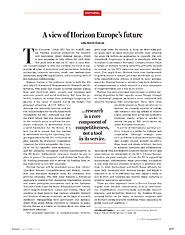Editorial
A view of Horizon Europe’s futureIn Section Editorial
The European Union (EU) has the world’s largest funding program exclusively for research and innovation (R&I)—Horizon Europe—which is now preparing its 10th edition for 2028–2034. The good news is that the EU aims to raise Horizon Europe’s budget by 83% and continue the trend of supporting all types of institutions and partnerships, including universities, research institutes, small-and medium-sized enterprises, nonprofit organizations, and a widening circle of international collaborations.
Horizon Europe is the nickname given to both the 9th and 10th EU Framework Programmes for Research and Innovation, with goals that require a careful balance among long-and short-term gains, security and openness, and economic growth and social well-being. R&I have the potential, however, to bridge these seemingly competing objectives. A key factor to success will be the budget: The proposed allocation of €175 billion is a welcome and necessary increase over the €95 billion budget for the 9th Framework Programme for R&I. Although less than the €200 billion that was recommended by the research sector to achieve the program’s objectives, it nevertheless forms a solid foundation for the future. It is now crucial to ensure that this funding is maintained during the upcoming budget negotiations by the EU institutions at play: namely, the European Commission (creating the initial proposals), the Council of the EU (member state ministers), and the European Parliament (elected representatives on the EU level). Additionally, structures should be put in place to protect the program’s legal distinction from other EU funding programs and to prevent its funding from being reallocated to non-R&I priorities.
Horizon Europe will be structured across four “pillars” (Excellent Science; Competitiveness and Society; Innovation; and European Research Area) for continuity with previous programs. The first pillar features a bottom-up approach to research that champions fundamental science and boasts prestigious instruments such as the European Research Council and the Marie Skłodowska-Curie Actions, which support researchers’ careers and training. These will continue to fund projects that embrace scientific curiosity and freedom of inquiry exclusively on the basis of scientific excellence. Safeguarding their governance and independence from policy-driven objectives is essential to maintaining Europe as a leader in bringing about new ideas and innovative solutions.
The proposed approach to competitiveness, however, gives some cause for concern. A focus on short-term policy goals, such as rapid economic growth, risks reducing the scope for bottom-up approaches to research. The new Framework Programme is meant to coordinate with the European Commission’s European Competitiveness Fund, a merger of multiple funding initiatives primarily focused on scaling up the EU’s industrial and economic development. This might divert Horizon funds from fundamental, long-term research toward priorities dominated by shortterm competitiveness criteria. It would be more advantageous for Horizon Europe to uphold a long-term definition of competitiveness in which research is a core component of competitiveness, not a tool in its service.
Horizon Europe’s continued commitment to reduce persisting disparities in R&I capacity across Europe through its “Widening” program promises a more integrated and cohesive European R&I environment. Here, more focus should be placed on “brain circulation” to increase the research capacity of regions and countries that lag behind to achieve a level playing field across the continent. However, clearer action is needed to reduce the gap in R&I performance between European countries.
In a time of international political conflicts, science is a bridge for dialogue and cooperation. Although strategic areas such as defense and advanced technology may require special security measures, these must not create arbitrary barriers to scientific openness and collaboration. Association with like-minded countries outside the EU and opportunities for researchers in the EU’s “Choose Europe” initiative are good examples of how the EU is supporting international collaboration while protecting researchers at risk from political pressure or threats to academic freedom. In 2025, Switzerland and South Korea officially became fully associated with Horizon Europe, and Egypt is expected to do so as well later this year. Japan is likely to join in 2026, and Australia has recently began exploring a potential association agreement.
There are other important issues in Horizon Europe that require more detailed consideration, such as administrative simplification, environmentally sustainable research practices, and inclusivity. However, the Horizon Europe proposal builds on the legacy of previous programs and on Europe’s strong research traditions, while expanding its global reach and ambition.
Übersetzung:
Leitartikel
16. Oktober 2025
Ein Blick in die Zukunft von Horizon Europe
Im Bereich Leitartikel
Lidia Borrell-Damián
Die Europäische Union (EU) verfügt mit Horizon Europe über das weltweit größte Förderprogramm ausschließlich für Forschung und Innovation (R&I). Derzeit wird die zehnte Auflage für den Zeitraum 2028–2034 vorbereitet. Erfreulicherweise plant die EU, das Budget von Horizon Europe um 83 % zu erhöhen und weiterhin alle Arten von Institutionen und Partnerschaften zu fördern, darunter Universitäten, Forschungsinstitute, kleine und mittlere Unternehmen, gemeinnützige Organisationen und ein wachsendes Netzwerk internationaler Kooperationen.
Horizon Europe ist die Bezeichnung für das neunte und zehnte EU-Rahmenprogramm für Forschung und Innovation. Dessen Ziele erfordern ein sorgfältiges Abwägen zwischen kurz- und langfristigen Vorteilen, Sicherheit und Offenheit sowie Wirtschaftswachstum und sozialem Wohlergehen. R&I birgt jedoch das Potenzial, diese scheinbar gegensätzlichen Ziele zu verbinden. Ein Schlüsselfaktor für den Erfolg wird das Budget sein: Die vorgeschlagene Zuweisung von 175 Milliarden Euro ist eine willkommene und notwendige Erhöhung gegenüber den 95 Milliarden Euro für das 9. Rahmenprogramm für Forschung und Innovation. Obwohl sie unter den von der Forschungsgemeinschaft empfohlenen 200 Milliarden Euro zur Erreichung der Programmziele liegt, bildet sie dennoch eine solide Grundlage für die Zukunft. Es ist nun entscheidend, die Aufrechterhaltung dieser Finanzierung während der anstehenden Haushaltsverhandlungen der beteiligten EU-Institutionen sicherzustellen: der Europäischen Kommission (die die ersten Vorschläge erstellt hat), des Rates der EU (die Minister der Mitgliedstaaten) und des Europäischen Parlaments (die gewählten Vertreter auf EU-Ebene). Darüber hinaus sollten Strukturen geschaffen werden, um die rechtliche Eigenständigkeit des Programms gegenüber anderen EU-Förderprogrammen zu wahren und zu verhindern, dass seine Mittel für andere Prioritäten als Forschung und Innovation umgewidmet werden.
Horizon Europe wird, um die Kontinuität mit früheren Programmen zu gewährleisten, auf vier Säulen basieren: Exzellente Wissenschaft, Wettbewerbsfähigkeit und Gesellschaft, Innovation und Europäischer Forschungsraum. Die erste Säule basiert auf einem partizipativen Forschungsansatz, der die Grundlagenforschung fördert und renommierte Instrumente wie den Europäischen Forschungsrat und die Marie-Skłodowska-Curie-Maßnahmen zur Unterstützung von Karrieren und Ausbildungen von Forschenden einsetzt. Diese werden weiterhin Projekte fördern, die wissenschaftliche Neugier und Forschungsfreiheit ausschließlich auf der Grundlage wissenschaftlicher Exzellenz unterstützen. Die Wahrung ihrer Unabhängigkeit von politischen Zielen ist unerlässlich, um Europas Führungsrolle bei der Entwicklung neuer Ideen und innovativer Lösungen zu sichern.
…Forschung ist ein Kernbestandteil der Wettbewerbsfähigkeit, nicht nur ein Mittel zum Zweck.
Der vorgeschlagene Ansatz zur Steigerung der Wettbewerbsfähigkeit gibt jedoch Anlass zur Sorge. Die Fokussierung auf kurzfristige politische Ziele wie schnelles Wirtschaftswachstum birgt die Gefahr, den Spielraum für partizipative Forschungsansätze einzuschränken. Das neue Rahmenprogramm soll mit dem Europäischen Wettbewerbsfonds der Europäischen Kommission koordiniert werden, einem Zusammenschluss mehrerer Förderinitiativen, die primär auf die Ausweitung der industriellen und wirtschaftlichen Entwicklung der EU ausgerichtet sind. Dies könnte dazu führen, dass Mittel aus Horizon von der langfristigen Grundlagenforschung hin zu Prioritäten umgeleitet werden, die von kurzfristigen Wettbewerbskriterien dominiert werden. Für Horizon Europe wäre es vorteilhafter, eine langfristige Definition von Wettbewerbsfähigkeit zu verfolgen, in der Forschung ein zentraler Bestandteil und nicht nur ein Mittel zum Zweck ist.
Horizon Europes kontinuierliches Engagement zur Verringerung der bestehenden Ungleichheiten in der Forschungs- und Innovationskapazität in Europa durch das Programm „Erweiterung“ verspricht ein integrierteres und kohärenteres europäisches Forschungs- und Innovationsumfeld. Hierbei sollte der Fokus stärker auf den Austausch von Fachkräften gelegt werden, um die Forschungskapazitäten von Regionen und Ländern mit Rückstand zu stärken und gleiche Wettbewerbsbedingungen auf dem gesamten Kontinent zu schaffen. Allerdings sind konkretere Maßnahmen erforderlich, um die Leistungsunterschiede in Forschung und Innovation zwischen den europäischen Ländern zu verringern.
In Zeiten internationaler politischer Konflikte ist die Wissenschaft eine Brücke für Dialog und Zusammenarbeit. Strategische Bereiche wie Verteidigung und Spitzentechnologie erfordern zwar besondere Sicherheitsmaßnahmen, diese dürfen jedoch keine willkürlichen Hindernisse für wissenschaftliche Offenheit und Kooperation schaffen. Die Zusammenarbeit mit gleichgesinnten Ländern außerhalb der EU und die Möglichkeiten für Forschende im Rahmen der EU-Initiative „Choose Europe“ sind gute Beispiele dafür, wie die EU die internationale Zusammenarbeit fördert und gleichzeitig gefährdete Forschende vor politischem Druck oder Bedrohungen der akademischen Freiheit schützt. Im Jahr 2025 traten die Schweiz und Südkorea offiziell Horizon Europe bei, und Ägypten wird voraussichtlich noch in diesem Jahr folgen. Japan wird voraussichtlich 2026 beitreten, und Australien prüft derzeit ein mögliches Assoziierungsabkommen.
Es gibt weitere wichtige Themen innerhalb von Horizon Europe, die einer detaillierteren Betrachtung bedürfen, wie beispielsweise die Vereinfachung der Verwaltung und umweltverträgliche Forschungspraktiken.


